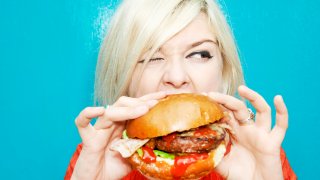
While many conscientious eaters think constantly about the food we're eating — how it will affect our hearts, the environment and most of all, our waistlines — we rarely think about its impact on our brains, mood and energy levels.
But the gut and the brain are in constant two-way communication, and the health of one directly influences the health of the other.
More specifically, when inflammation is present in the gut, less energy is available to the brain and body. That's because low-grade inflammation flips off a metabolic switch in the chemical pathway that produces energy.
The result is not only lower energy but an increase in free radicals that damage brain tissue.
Get a weekly recap of the latest San Francisco Bay Area housing news. Sign up for NBC Bay Area’s Housing Deconstructed newsletter.
Foods that can cause anxiety and fatigue
Understanding which foods contribute to chronic inflammation of the gut and brain is a powerful step in managing your mood and energy levels.
As a nutritional psychiatrist, I always try to avoid these five types of foods that can make you tired and stressed:
Money Report
1. Processed foods
Consuming unhealthy processed foods like baked goods and soda, which are loaded with refined and added sugars — often in the form of high-fructose corn syrup — floods the brain with too much glucose. This "sugar flood" can lead to inflammation in the brain and may ultimately result in depression and fatigue.
Instead of buying processed foods, I recommend reaching for nutrient-dense whole foods like fresh or vegetables and clean proteins like organic grass-fed beef and wild or sustainably-caught fish.
2. Industrial seed oils
The industrialization of the food industry has led to the development of inexpensive, highly processed oils created from the byproduct of abundant crops. These include corn, grapeseed, soybean sunflower and palm oils.
Through processing, these oils become incredibly high in inflammatory omega-6 fatty acids and devoid of anti-inflammatory omega-3, which promotes brain health. Studies have shown that people who consume foods high in omega-6 fatty acids are at higher risk of depression compared to those who consume foods high in omega-3s.
Opt for anti-inflammatory alternatives like extra virgin olive oil or avocado oil when cooking.
3. Added and refined sugars
While you might expect sugar to be common in pastry desserts or boxed cereals, it can also be found in surprising foods like ketchup, salad dressings and savory items like french fries.
Added and refined sugars exacerbate inflammation and overwhelm the body with more sugar than it needs, which can create increased anxiety and unstable mood levels.
Because sugar has an addictive effect, the less of it we eat over time, the less we will crave. To cut down on your sugar dependency, shop for whole foods that are not made with added sugars.
When I'm absolutely craving something sweet, I'll reach for a handful of blueberries or a bite of extra dark chocolate.
4. Fried foods
Tempura, empanadas, samosas, fish and chips, fried chicken — is your mouth watering yet? I get it. Still, it pays to reduce the amount of fried foods you eat.
A 2016 study looked at 715 factory workers and measured their levels of depression, resilience and fried food consumption. Sure enough, researchers found that people who consumed more fried foods were more likely to develop depression in their lifetime.
Fried foods are likely mood killers because they're usually fried in unhealthy fats. In recent years, the conversation around fat in diet has changed. Now nutritionists distinguish between "bad fats" (i.e., margarine, hydrogenated oils), which are known to cause cardiovascular disease and other woes, and "good fats" (i.e., avocados, olive oil) that can help benefit well-being.
5. Artificial sweeteners
Sugar replacements are increasingly common in foods that claim to be "healthy" by helping you cut down on calories.
That's alarming, because science implicates many artificial sweeteners can contribute to depression. One study showed that people who consume artificial sweeteners, mostly via diet drinks, are more depressed than those who don't consume them.
Even worse, several studies have demonstrated that artificial sweeteners can be toxic to the brain, altering concentrations of mood-regulating neurotransmitters.
To cut down on artificial sweeteners, put natural sweeteners like honey or agave nectar in your beverages.
Foods that fight fatigue
Here are the foods, vitamins, and nutrients I try to embrace for a happy brain and healthy body:
- Probiotics: yogurt with active cultures, tempeh, miso, sauerkraut, kefir, kimchi, kombucha and certain cheeses
- Prebiotics: beans, oats, bananas, berries, garlic, onions, dandelion greens, asparagus, artichokes and leeks
- Low-GI carbohydrates: brown rice, quinoa, steel-cut oatmeal and chia seeds
- Medium-GI foods, in moderation: honey, orange juice and whole-grain bread
- Healthy fats: monounsaturated fats like olive oil, nuts, nut butters and avocados
- Omega-3 fatty acids: fish, especially fatty fish like salmon, mackerel, tuna, herring and sardines.
- Vitamins: B9, B12, B1, B6, A and C
- Minerals and micronutrients: iron, magnesium, potassium, zinc and selenium
- Spices: saffron and turmeric
- Herbs: oregano, lavender, passionflower and chamomile
Keep in mind that changing your diet alone won't help you fully prevent or cure depression and anxiety. But changing your eating habits can lead to positive effects that leave you feeling energized and rejuvenated.
Dr. Uma Naidoo is a nutritional psychiatrist, brain expert, and faculty member at Harvard Medical School. She is also the Director of Nutritional & Lifestyle Psychiatry at Massachusetts General Hospital and author of the best-selling book "This Is Your Brain on Food: An Indispensable Guide to the Surprising Foods that Fight Depression, Anxiety, PTSD, OCD, ADHD, and More." Follow her on Twitter and Instagram.
Don't miss:
- A Harvard nutritionist and brain expert shares the 5 foods she eats every day to sharpen her memory and focus
- Brain expert: Avoid these 5 foods that 'weaken memory and focus'
A Harvard nutritionist shares the 6 best brain foods: ‘Most people aren’t eating enough of’ these
Sign up now: Get smarter about your money and career with our weekly newsletter






